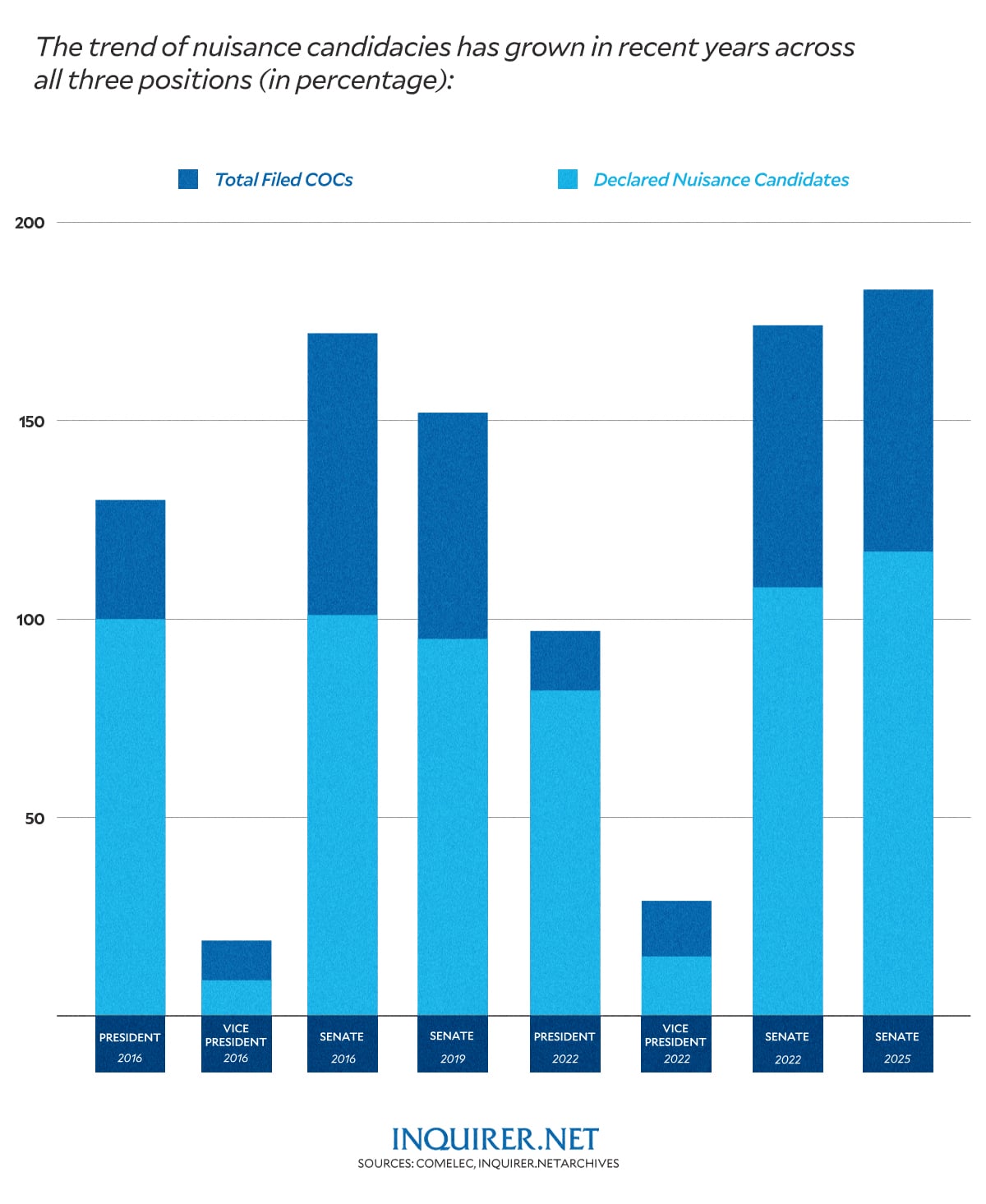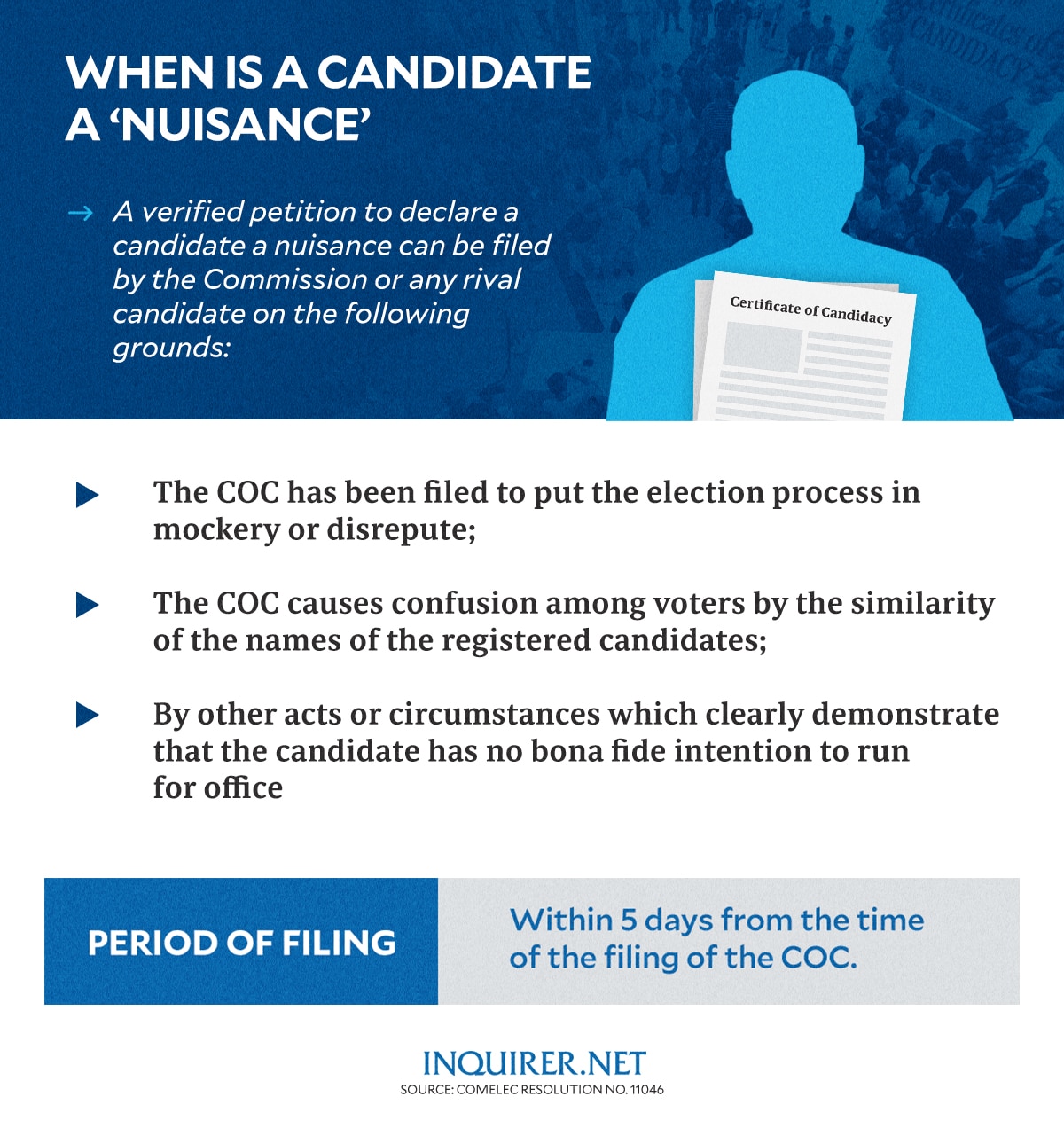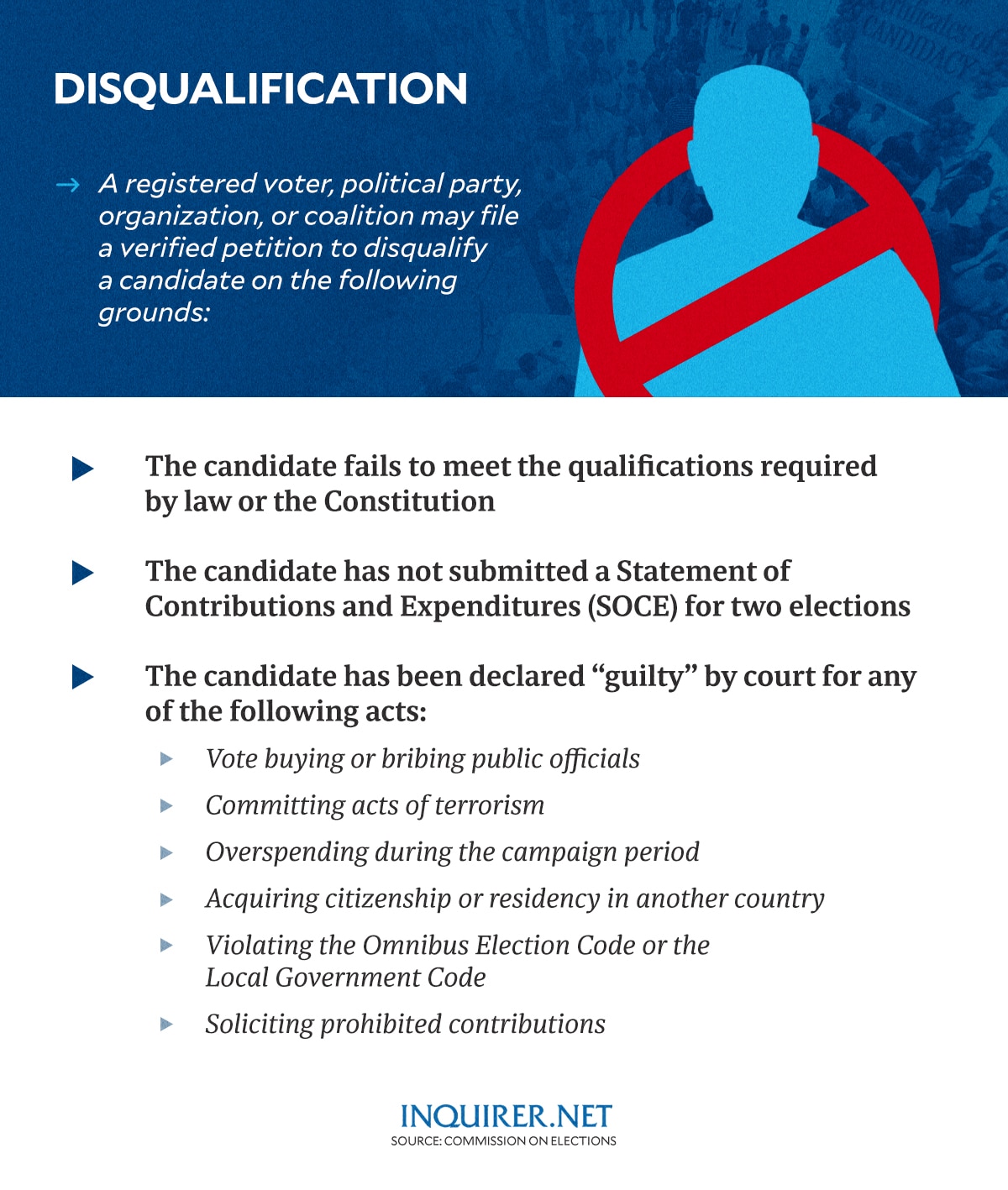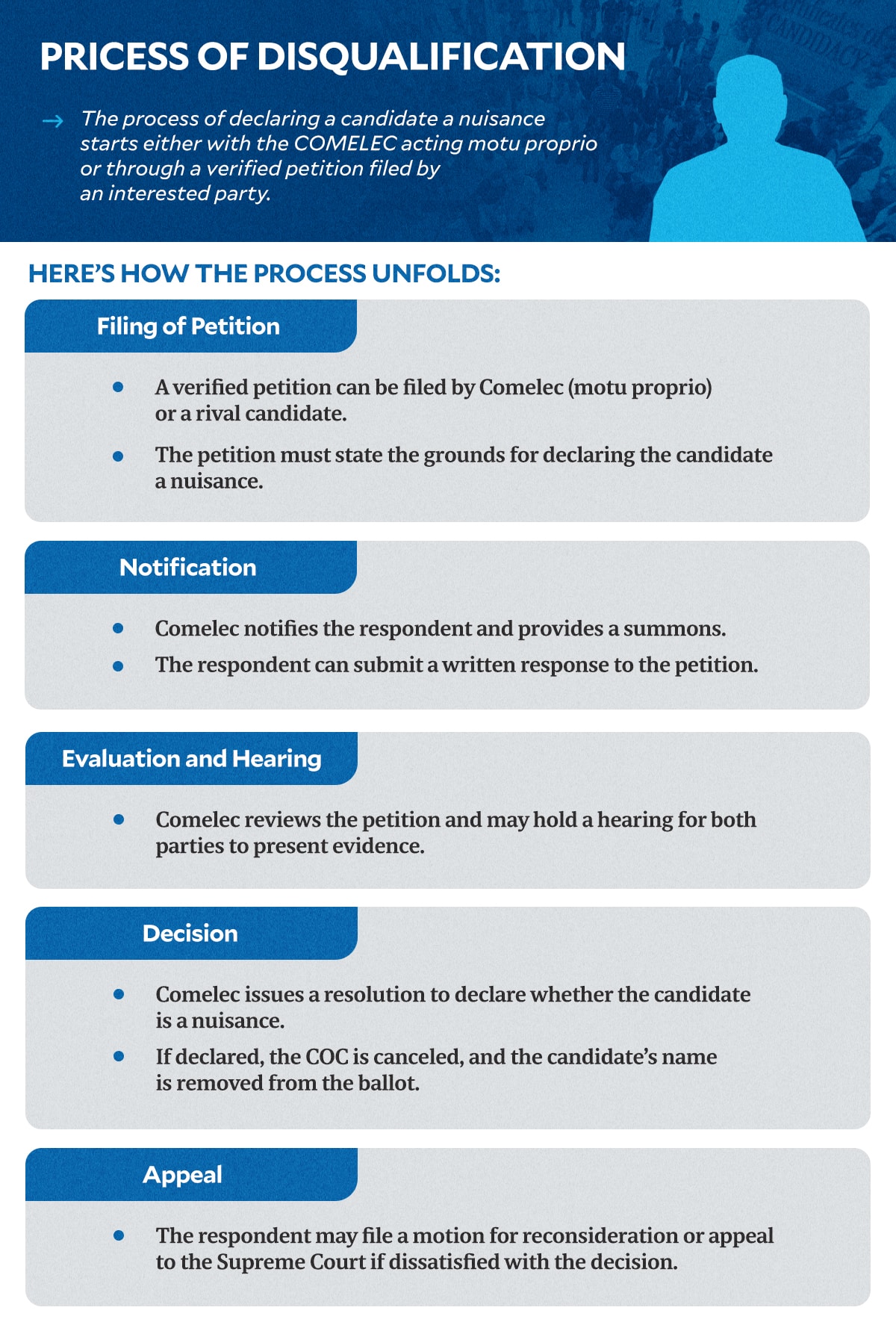
ELECTION composite image from Inquirer file/stock photos
MANILA, Philippines—With the midterm elections just around the corner, the Commission on Elections (Comelec) has wrapped up the grueling task of sieving through a sea of Certificates of Candidacy (COCs).
Among the names — some familiar, some new — are those that voters may not see on the ballot at all: candidates flagged as “nuisance.”
Article continues after this advertisementAs the number of COCs filed surges each election season, so too does the phenomenon of nuisance candidacies.
FEATURED STORIES NEWSINFO Taguba says he never changed tune on Paolo Duterte NEWSINFO VP Sara Duterte amid political heat: ‘We will not break’ NEWSINFO LPA formation between Visayas and Mindanao likely this weekend – PagasaThese cases, where individuals file without a bona fide intention to run, have led Comelec to wield its power to clean up the electoral process.
But what does it mean to be labeled a “nuisance candidate”?
Article continues after this advertisement By the numbers: More nuisance candidatesData from the poll body show a growing trend of nuisance candidacies over the years, particularly in high-profile national positions.
Article continues after this advertisementIn the 2016 elections, nearly 77 percent of presidential aspirants (100 out of 130) and 59 percent of senatorial hopefuls (101 out of 172) were declared nuisances. By 2022, the rate of nuisance candidates for the presidency surged to 84.54 percent (82 out of 97), while the Senate race maintained a high rate of over 62 percent (108 out of 174).
Article continues after this advertisementAmong these numbers are notable names that have sparked public and legal debates. One prominent example is Tiburcio Marcos, who filed his candidacy for the presidency in 2022 while simultaneously challenging the legitimacy of then-candidate Ferdinand “Bongbong” Marcos Jr.


GRAPHIC: Ed Lustan / INQUIRER.net
In his petition, Tiburcio claimed that the “real” Marcos Jr. had allegedly died years ago and that the individual who filed the COC for the presidency was an impostor. This claim ties into a long-standing urban legend suggesting that the “real” Marcos Jr. met an untimely demise.
Article continues after this advertisementAccording to the legend, Marcos Jr. was allegedly stabbed to death during a scuffle while studying abroad. In response, the Marcos family is said to have searched for a look-alike to take his place and preserve the family’s public image.
Despite its persistence in rumor mills, this story has been widely dismissed as baseless and lacking credible evidence, much like Tiburcio’s petition, which the Comelec ultimately dismissed for lack of merit.
READ: Is Bongbong really dead? Comelec asked to junk COC of Marcos ‘impostor’
Meanwhile, Tiburcio himself was declared a nuisance candidate by the poll body and removed from the official list.
READ: Comelec dismisses petition to cancel COC of Marcos Jr.
For the 2025 midterm elections, Comelec announced on November 20 that it had disqualified 117 senatorial aspirants, declaring them nuisance candidates based on recommendations from the poll body’s law department.
Out of the 183 individuals who filed their COCs for senator during the filing period in Manila from Oct. 1 to Oct. 8, only 66 were approved as legitimate and valid candidates by Comelec last month.
What makes a nuisance candidate?According to Comelec chairman George Garcia, the grounds for declaring an aspirant’s candidacy as a “nuisance” are based on Section 69 of the Omnibus Election Code, which states that a candidate may be declared a nuisance if:
Their COC is filed to mock or discredit the election process. Their candidacy causes confusion, such as by having or mimicking the names of registered candidates. Their actions or circumstances demonstrate a lack of genuine intent to run for office, undermining the voters’ ability to determine the true will of the electorate.The Comelec chair explained that the poll body applies a “totality rule” when determining nuisance candidates. This approach evaluates various factors, including whether a candidate is running as an independent, lacks affiliation with a political party, or has no discernible presence on social media.


GRAPHIC: Ed Lustan / INQUIRER.net
He further noted that the absence of public statements, policy proposals, or a clear platform can also influence the evaluation under this rule.
Garcia highlighted a Supreme Court ruling stating that an aspirant cannot be deemed a nuisance candidate if they are affiliated with a political party. However, he clarified that each case is evaluated individually, as circumstances may vary.
Clarifying grounds for nuisance candidaciesIn an episode of the Supreme Court Podcast, lawyer Mc Vincent Nierra from the Office of Associate Justice Lazaro Javier outlined the factors that should not be used as grounds for declaring an individual as a nuisance candidate.
“First and foremost, being virtually unknown to the entire country except the locality where the candidate resides, because this reduces the election to a popularity contest. Next, non-membership in a political party, or lack of political connections or affiliations,” Nierra explained.
“Third, failure to prove financial capacity, and lastly, perceived inability to mount a successful election campaign,” he continued.
Although the poll body adheres to specific criteria and factors in identifying nuisance candidates, the high court underscored that petitions to disqualify candidates as nuisances must be supported by substantial evidence, not mere assumptions.
Nuisance or unfair exclusion?Norman Cordero Marquez, an animal rights advocate and co-founder of Baguio Animal Welfare, became the center of a controversial case on what defines a nuisance candidate. Despite his advocacy work and legal battles, Marquez was disqualified by Comelec in the 2019 and 2022 senatorial races.
In 2019, Comelec ruled that Marquez lacked the financial resources to run a nationwide campaign, a decision that the Supreme Court later overturned. The court stressed that financial incapacity cannot be used as grounds for disqualification, as this would effectively impose unconstitutional property qualifications on candidates.


GRAPHIC: Ed Lustan / INQUIRER.net
But Comelec once again declared Marquez a nuisance candidate in 2021, citing his lack of bona fide intent to run for a national position. The poll body argued that he was “virtually unknown to the entire country” and did not have the backing of a political party.
The Supreme Court ultimately ruled in favor of Marquez, stating that unpopularity and financial constraints are not valid reasons to disqualify a candidate. The Court also pointed out that no one would endure the extensive legal process — not just once, but twice — without a genuine intent to seek office.
READ: SC: Unpopularity, non-membership not grounds for declaration as nuisance candidate
“Declaring one a nuisance candidate simply because he or she is not known to the entire country reduces the electoral process — a sacred instrument of democracy — to a mere popularity contest. The matter of the candidate being known (or unknown) should not be taken against the candidate but is best left to the electorate,” held the Court.
In the decision posted on Sept. 10, 2022 — months after the 2022 polls concluded — the Supreme Court chose to address Marquez’s case, noting that similar situations could arise in the future.
Marquez is again vying for a Senate seat in the 2025 elections.
Why is it necessary to declare nuisance candidates?With so many political hopefuls running for office every election, why does the poll body insist on declaring some as nuisance candidates despite the backlash and opposition it often faces from those disqualified?
“From a practical point of view, if you don’t adopt a mechanism to exclude nuisance candidates, there just wouldn’t be enough space on our ballots, as the Comelec claimed in their submissions,” Nierra said in the Supreme Court Podcast.
“Simply saying in this case is that the Comelec must clearly prove that a candidate is a nuisance before they can be excluded from the ballot,” he added.


GRAPHIC: Ed Lustan / INQUIRER.net
Comelec, meanwhile, defended its decision to disqualify individuals as nuisance candidates, stating that it was simply following the law.
Under the Omnibus Election Code of the Philippines (Batas Pambansa Blg. 881), the Comelec is tasked with filtering out “nuisance candidates,” often referred to as fringe candidates in other countries, to protect the integrity of the electoral process.
Comelec also pointed out that disqualified aspirants can still appeal their cases to the Supreme Court, which has overturned some of the poll body’s decisions in the past. This provides a legal recourse for those who feel they were unfairly barred from running.
READ: Francis Leo Marcos, 13 other ‘nuisance’ candidates oppose Comelec tag
Garcia recently clarified that the 117 disqualified senatorial aspirants were not declared nuisance candidates simply because they lacked financial resources or political backing.
“Our law department has conducted background checks on these candidates. We looked into their previous pronouncements. We checked if they are just making a mockery out of our election process or if they are really serious in their electoral run,” he said.
While some of the disqualified aspirants have expressed disappointment and filed motions for reconsideration to contest Comelec’s decision, the poll body stressed the urgency of finalizing the list of candidates.
As of Nov. 29, Comelec has rejected the motion for reconsideration filed by 18 senatorial aspirants, previously identified by the poll body as nuisance candidates.
Subscribe to our daily newsletter
Comelec aims to conclude the process by the end of November to meet the December deadline for printing ballots.vipph
READ NEXT Marcos vows to support local manufacturers to ensure food secu... Bongbong Marcos to Sara Duterte: Point of no return? Never say... EDITORS' PICK South Korea scrambles jets as Chinese, Russian warplanes approach Andrea del Rosario recalls meeting Vin Diesel, being invited to his parties DA reimposes ban on poultry from California Harry Roque skips DOJ probe into qualified human trafficking issue PBA: Standhardinger rights can stay with Terrafirma despite retirement House: We never had impeachment move vs VP Duterte on our agenda MOST READ Comelec junks plea of 18 nuisance bets, one of them to seek SC's help South Korea scrambles jets as Chinese, Russian warplanes approach Taguba says he never changed tune on Paolo Duterte Marcos says he ordered impeachment moves vs VP Sara Duterte stopped Follow @FMangosingINQ on Twitter --> View comments